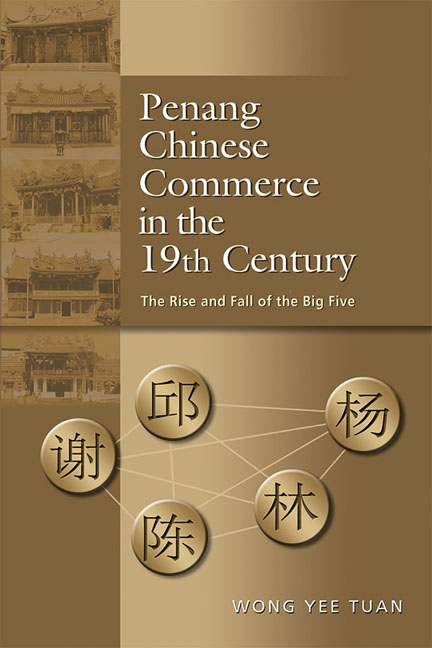Book contents
- Frontmatter
- Dedication
- Contents
- List of Tables, Diagrams and Maps
- Acknowledgements
- Glossary
- Abbreviations and Acronyms
- Notes on Spelling and Names
- Notes on Currencies
- Map
- 1 Introduction
- 2 Penang and the Big Five in Regional Context
- 3 Kith and Kin: The Big Five Familial Web
- 4 Opium Farm Rivalry
- 5 The Contest for ‘White Gold’
- 6 Western Mercantile Elite and Their Challenge to the Penang Chinese
- 7 New Regional Order and the Decline of the Big Five
- 8 Conclusion
- Appendices
- Bibliography
- Index
- About the Author
- Platesection
- Map
- Frontmatter
- Dedication
- Contents
- List of Tables, Diagrams and Maps
- Acknowledgements
- Glossary
- Abbreviations and Acronyms
- Notes on Spelling and Names
- Notes on Currencies
- Map
- 1 Introduction
- 2 Penang and the Big Five in Regional Context
- 3 Kith and Kin: The Big Five Familial Web
- 4 Opium Farm Rivalry
- 5 The Contest for ‘White Gold’
- 6 Western Mercantile Elite and Their Challenge to the Penang Chinese
- 7 New Regional Order and the Decline of the Big Five
- 8 Conclusion
- Appendices
- Bibliography
- Index
- About the Author
- Platesection
- Map
Summary
As a Hakka boy born and raised in Perak, despite its proximity, I only learned about Penang as a trading port established by Francis Light from school history texts. It was not until a trip in the year 2000 that I came to know Penang better personally. Walking around the streets of George Town, the business centre of Penang, I was amazed to see five temple-like kongsi houses standing magnificently in the middle of the town. These five kongsis are believed to have owned at least half of the shops and houses in the old part of George Town. More interestingly, they were once connected with each other by some secret passages and started the worst riots in the British colony at that time. Later, I came to know that a group of wealthy merchants from five Hokkien families founded these kongsisin the nineteenth century. Despite all this mythology, surprisingly, no one has ever seen fit to place them under a scholarly examination. Who were these Hokkien merchants and what roles did they play in Penang? How important were they? It was questions like these that stimulated me to ponder the relationship between those little-known Hokkien merchants and Penang about two centuries ago and to embark on researching the story about them.
In the existing literature, Penang's history has been framed within a colonial paradigm and studied from a top-down angle. The rise of Penang as a hub of commerce and trade, to many scholars, was due to the British free trade and free port policies as well as the legendary Francis Light. As L.A. Mills commented in 1925:
During these years from 1786 to 1800 the population and trade of Penang were rapidly increasing… This seems to be traceable to three principal causes — the remarkable energy with which Light pushed forward the development of the settlement, the great trust the natives had in him, and the system of free trade which prevailed until 1802 (Mills 1925, p. 42).
Seventy years later, echoing Mill's view, Sundara Raja remarked in 1997 that Francis Light, who promoted free trade, contributed greatly to making Penang a free port which stimulated vigorous trade and growing migrant settlement (Raja 1997, pp. 104–8). For these scholars it seems the colonial factor was central and sufficient in itself to explain the rise of Penang.
- Type
- Chapter
- Information
- Penang Chinese Commerce in the 19th CenturyThe Rise and Fall of the Big Five, pp. 1 - 13Publisher: ISEAS–Yusof Ishak InstitutePrint publication year: 2015

